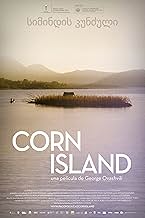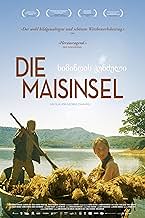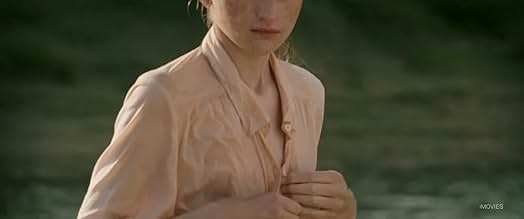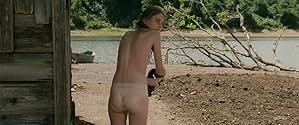VALUTAZIONE IMDb
7,4/10
4801
LA TUA VALUTAZIONE
Il fiume crea e il fiume distrugge, in un ciclo eterno a cui neanche gli uomini possono sottrarsi.Il fiume crea e il fiume distrugge, in un ciclo eterno a cui neanche gli uomini possono sottrarsi.Il fiume crea e il fiume distrugge, in un ciclo eterno a cui neanche gli uomini possono sottrarsi.
- Regia
- Sceneggiatura
- Star
- Premi
- 23 vittorie e 12 candidature totali
Recensioni in evidenza
"Corn island" is about islands that run dry in early spring and are swallowed up by the river again during winter. In the meantime it is very fertile land and farmers from the neigbourhood are keen to occupy such an island in order to sow and harvest corn.
From the above description it is clear that "Corn island" is a slow movie about a slow and peaceful live. You can nearly see the corn crow. This slow and peaceful live however is disrupted in multiple ways.
In the first place is the corn island of this movie situated in a disputed territory between two countries. Rival soldiers are regularly passing by the island. The farmer is determined to stay out of this war. Will he succeed? This aspect of the film reminded me of the Dutch novel "The house of refuge" (1952, Willem Frederik Hermans).
A farmers live is always governed by the seasons, but that is especially true if your field is on a temporary island. The second cause of disruption.
Not only the corn is growing, but also the granddaughter of the farmer. This fact does not pass unnoticed by the passing soldiers, forming the third disruptive force. This third aspect of the film is in my opinion the weakest. The coming of age is portrayed using a lot of clichés such as suddenly being tired of your favorite doll or experiencing the first menstrual cycle.
After "In bloom" (2013, Nana Ekvtimishvili) "Corn island" was the second film from Georgia I saw within a year. Remarkable was the large share that the grandparents had in both films in raising their grandchildren. A coincidence?
From the above description it is clear that "Corn island" is a slow movie about a slow and peaceful live. You can nearly see the corn crow. This slow and peaceful live however is disrupted in multiple ways.
In the first place is the corn island of this movie situated in a disputed territory between two countries. Rival soldiers are regularly passing by the island. The farmer is determined to stay out of this war. Will he succeed? This aspect of the film reminded me of the Dutch novel "The house of refuge" (1952, Willem Frederik Hermans).
A farmers live is always governed by the seasons, but that is especially true if your field is on a temporary island. The second cause of disruption.
Not only the corn is growing, but also the granddaughter of the farmer. This fact does not pass unnoticed by the passing soldiers, forming the third disruptive force. This third aspect of the film is in my opinion the weakest. The coming of age is portrayed using a lot of clichés such as suddenly being tired of your favorite doll or experiencing the first menstrual cycle.
After "In bloom" (2013, Nana Ekvtimishvili) "Corn island" was the second film from Georgia I saw within a year. Remarkable was the large share that the grandparents had in both films in raising their grandchildren. A coincidence?
I actually stumbled upon this film by accident. In my search for all things horror, I came across "Corn Island" somewhere. Maybe there is another "Corn Island" movie lurking about, but this definitely wasn't it. About 15 or 20 minutes in, when I realized that this wasn't horror, I kept it playing anyway because it did seem interesting.
Really, it was almost a silent feature as the characters didn't speak much. What intrigued me was the Georgian setting, the picturesque cinematography, the backdrop of war, and the whole idea about planting corn on an island year after year. Acting all around was good, too.
When I was younger I spent a lot of time watching foreign language dramas from France, Russia, Turkey, Japan, Belgium, Germany, the Netherlands and other places. I think it's time to give films from Georgia my full attention, too, since they seem to rate so high right here on IMDb.
Really, it was almost a silent feature as the characters didn't speak much. What intrigued me was the Georgian setting, the picturesque cinematography, the backdrop of war, and the whole idea about planting corn on an island year after year. Acting all around was good, too.
When I was younger I spent a lot of time watching foreign language dramas from France, Russia, Turkey, Japan, Belgium, Germany, the Netherlands and other places. I think it's time to give films from Georgia my full attention, too, since they seem to rate so high right here on IMDb.
George Ovashvili's film was showing on my cable, and I decided to check it out... it's actually a film from a decade ago that made the rounds at every major film festival and ended up with 23 wins and 12 nominations! I must say, it truly deserved every single one of them!
The story, written by Roelof Jan Minneboo, George Ovashvili, and Nugzar Shataidze, transports us to Georgia, where the Inguri River's water level drops annually, revealing islands with fertile river-bottom soil. The locals can temporarily claim these islands for a season to grow crops, so an elderly man in an old wooden boat slowly makes his way to one such island. He measures it, digs the earth, tastes the soil, decides it's suitable, and marks his claim with a piece of cloth on a stick. He leaves and returns repeatedly, bringing supplies, including scrap lumber to build a cabin with a thatched roof, and then planting corn with the help of his teenager granddaughter. Almost no words are spoken, so don't worry if you don't have subtitles (for some reason, I only had German subtitles) - you'll be just fine!
A significant aspect of this film is the profound connection between the man and nature, conveyed through captivating imagery and visuals - a timeless story that seems so primitive... intentionally so, in my opinion.
Another aspect of the film is the island's location: in the middle of the Inguri River, dividing Georgia from Abkhazia. This off-screen conflict brings soldiers from both sides, disturbing the intense bond between nature and the old man and his granddaughter.
The film takes its time with everything, and it follows the nature's pace of the flowing river, growing corn... and it feels great watching things unfolding slowly. Real life feeling! Almost perfect film!
The story, written by Roelof Jan Minneboo, George Ovashvili, and Nugzar Shataidze, transports us to Georgia, where the Inguri River's water level drops annually, revealing islands with fertile river-bottom soil. The locals can temporarily claim these islands for a season to grow crops, so an elderly man in an old wooden boat slowly makes his way to one such island. He measures it, digs the earth, tastes the soil, decides it's suitable, and marks his claim with a piece of cloth on a stick. He leaves and returns repeatedly, bringing supplies, including scrap lumber to build a cabin with a thatched roof, and then planting corn with the help of his teenager granddaughter. Almost no words are spoken, so don't worry if you don't have subtitles (for some reason, I only had German subtitles) - you'll be just fine!
A significant aspect of this film is the profound connection between the man and nature, conveyed through captivating imagery and visuals - a timeless story that seems so primitive... intentionally so, in my opinion.
Another aspect of the film is the island's location: in the middle of the Inguri River, dividing Georgia from Abkhazia. This off-screen conflict brings soldiers from both sides, disturbing the intense bond between nature and the old man and his granddaughter.
The film takes its time with everything, and it follows the nature's pace of the flowing river, growing corn... and it feels great watching things unfolding slowly. Real life feeling! Almost perfect film!
Every year, the level of the Enguri River drops to uncover islands with fertile river-bottom soil. Locals can temporarily claim these islands for a season to grow a subsistence crop. An old man with one oar in an old wooden boat slowly makes his way to just such an island. He paces it off, digs the earth, tastes the soil, decides it will do, and marks his claim with a scrap of cloth on a stick. He leaves and then returns again and again, bringing supplies including scrap lumber to build a cabin with a thatched roof and then to plant corn with the help of his granddaughter who's in her early adolescence. Almost no words are spoken.
A big part of this film is thus man versus nature. Will nature allow the old man and his granddaughter to scratch a living from this transient plot of land? This part of the film might as well be prehistoric because it's so primitive. Intentionally so.
There's another part of the film caused by the island's location: in no-man's land between the warring country of Georgia and Abkhazia, a breakaway territory. This off-screen conflict brings soldiers from both sides into the film and we have man versus man versus man.
The film takes its time in all things. It's slaved to nature's pace and the growing corn. Things unfold slowly. Some of them aren't explained. That's the way it is in real life.
If you like artistic films with beautiful cinematography, this is a film for you. If you're looking for complex ideas and twisted plots, look elsewhere. This is a primal film about conflicts in nature, conflicts between men.
A big part of this film is thus man versus nature. Will nature allow the old man and his granddaughter to scratch a living from this transient plot of land? This part of the film might as well be prehistoric because it's so primitive. Intentionally so.
There's another part of the film caused by the island's location: in no-man's land between the warring country of Georgia and Abkhazia, a breakaway territory. This off-screen conflict brings soldiers from both sides into the film and we have man versus man versus man.
The film takes its time in all things. It's slaved to nature's pace and the growing corn. Things unfold slowly. Some of them aren't explained. That's the way it is in real life.
If you like artistic films with beautiful cinematography, this is a film for you. If you're looking for complex ideas and twisted plots, look elsewhere. This is a primal film about conflicts in nature, conflicts between men.
Every spring the Inguri River, which forms the boundary between Georgia and Abkhazia, washes down rocks and soil creating tiny islands. Local peasants leave the riverbanks for the firm, fertile island soil to grow corn through the summer before they are eroded away by winter. Georgia's submission for Best Foreign Language Film Corn Islanddirected by George Ovashvili follows a nondescript ageing farmer and his naive granddaughter as they migrate to an island and cultivate a year's crop. During such time, border patrols from both Georgia and Abkhaz pass by, causing tensions to rise between each other while the protagonists are caught in the middle.
Corn Island provokes an idea most memorable in the finale of Jean Renoir's The Grand Illusion – this illusion being the definitions of land ownership. Through nature's creation of a temporary island and then the Old Man's claim of his own little country, the film poetically points out the irrationality of conflict over differences from being born on different pieces of land. It's thoroughly profound, but one only teased in the otherwise sparse film. Ovashvili's approach is very reminiscent of the work of Ki-duk Kim, especially Spring, Summer, Fall, Winter and Spring, with the tranquil relationship with nature, meditative pace and limited dynamics, but equal in their beauty.
The narrative is procedural, simply watching the characters build a hut, plant the seeds and farm the crop. It's lethargic, but engaging. For the most part, the characters are blank slates, but it's about what they represent. It's all about the elements, and they're always fragile and unbalanced, as the film works on the natural tension of impending and inevitable expiration. Tensions do rise when the soldiers pass by in the boats, and there is character development with the granddaughter, who's in the throes of puberty. As she catches their eye and they to her, her internal conflict about her desires for outsiders illustrates the fateful and fatal sparks between nations.
The film's elegance is owed to the precise and impressive aesthetics. Veteran Hungarian cinematographer Elemer Ragalyi's serene gliding photography captures the world on a grand but desolate scale. In essence, the film is a soundscape, with no dialogue and hardly any score until near the end. The sharp sound work creates a palpable atmosphere like last year's All is Lost. The film does suffer in its rare moments of dialogue as Ovashvili is more confident in the naturalistic poetry of man against man and man against nature but those scenes don't drag the film down. Corn Island is a slow-burning but well-executed thought- provoking film that's worth watching, especially for fans of art cinema on the lookout for fresh faces.
8/10
Read more @ The Awards Circuit (http://www.awardscircuit.com/)
Corn Island provokes an idea most memorable in the finale of Jean Renoir's The Grand Illusion – this illusion being the definitions of land ownership. Through nature's creation of a temporary island and then the Old Man's claim of his own little country, the film poetically points out the irrationality of conflict over differences from being born on different pieces of land. It's thoroughly profound, but one only teased in the otherwise sparse film. Ovashvili's approach is very reminiscent of the work of Ki-duk Kim, especially Spring, Summer, Fall, Winter and Spring, with the tranquil relationship with nature, meditative pace and limited dynamics, but equal in their beauty.
The narrative is procedural, simply watching the characters build a hut, plant the seeds and farm the crop. It's lethargic, but engaging. For the most part, the characters are blank slates, but it's about what they represent. It's all about the elements, and they're always fragile and unbalanced, as the film works on the natural tension of impending and inevitable expiration. Tensions do rise when the soldiers pass by in the boats, and there is character development with the granddaughter, who's in the throes of puberty. As she catches their eye and they to her, her internal conflict about her desires for outsiders illustrates the fateful and fatal sparks between nations.
The film's elegance is owed to the precise and impressive aesthetics. Veteran Hungarian cinematographer Elemer Ragalyi's serene gliding photography captures the world on a grand but desolate scale. In essence, the film is a soundscape, with no dialogue and hardly any score until near the end. The sharp sound work creates a palpable atmosphere like last year's All is Lost. The film does suffer in its rare moments of dialogue as Ovashvili is more confident in the naturalistic poetry of man against man and man against nature but those scenes don't drag the film down. Corn Island is a slow-burning but well-executed thought- provoking film that's worth watching, especially for fans of art cinema on the lookout for fresh faces.
8/10
Read more @ The Awards Circuit (http://www.awardscircuit.com/)
Lo sapevi?
- QuizIn order to find the location for this movie, the filmmakers had been looking for a real island for two years. Eventually, they realised it would be too complicated and too dangerous to film on such a place. Instead, they built the island on an artificial lake, where they could control the water level to some extent, director George Ovashvili revealed in an interview.
- ConnessioniReferenced in CT na MFF Karlovy Vary 2017: Generální reditel Petr Dvorák (2017)
I più visti
Accedi per valutare e creare un elenco di titoli salvati per ottenere consigli personalizzati
- How long is Corn Island?Powered by Alexa
Dettagli
- Data di uscita
- Paesi di origine
- Sito ufficiale
- Lingue
- Celebre anche come
- Simindis kundzuli
- Luoghi delle riprese
- Aziende produttrici
- Vedi altri crediti dell’azienda su IMDbPro
Botteghino
- Budget
- 1.500.000 € (previsto)
- Lordo in tutto il mondo
- 37.445 USD
Contribuisci a questa pagina
Suggerisci una modifica o aggiungi i contenuti mancanti











